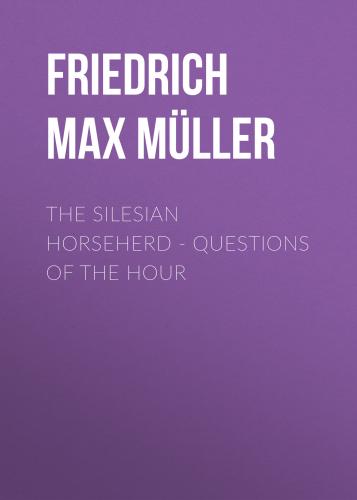But whatever Celsus may have been,—an Epicurean, or, as has occasionally been maintained, a Neo-platonist,—he was at all events no mean adversary and certainly not unworthy of Origen's steel. If not, why should Origen have felt the need of such an earnest refutation? He says, certainly, that he did it only at the request of his old friend and protector, Ambrosius. But that is what many writers under similar circumstances have said and still say. We have, at all events, lost much through the loss (or destruction?) of all manuscripts of Celsus. Not only was he acquainted with the principal philosophical schools of antiquity, he appears also to have studied zealously the religions of the ancient world as they were known at that time to the learned, especially in Alexandria, of which we have but scant knowledge. Origen expressly states (I, 14) that Celsus described the various peoples who possessed religious and philosophical systems, because he supposed that all these views bore a certain relationship to one another. Without a doubt much has been here lost to us, not only for the history of Greek philosophy, but also for the history of Oriental religions and philosophies, whose representatives at that time sojourned in Alexandria, yet as to whose personal influence we are almost entirely in the dark. Celsus is presumed to have written of the doctrines of the Egyptians, the Assyrians, the Jews, Persians, Odrysians, Samothracians, Eleusinians, even of the Samaneans, i.e. the Buddhists (I, 24), and to have represented these as better accredited than those of the Jews. We see anew what treasures were stored up in Alexandria, and we feel all the more deeply their irrevocable loss. The desire and the hope of recovering the work of Celsus were therefore quite natural for any who wished to penetrate more deeply into the spiritual atmosphere of the second and third centuries, and especially for such as strove to understand clearly how men of this age, versed in philosophy, such as Clement and Origen himself, could confess Christianity, or become converted to it, or could defend it against other philosophers without in the least becoming untrue to their philosophical convictions. That the lower classes among Jews and Greeks followed the new teaching, is much more intelligible, even without wishing to lay too much stress on the evidential value of the miracles at that time. The great majority were accustomed to miracles; what was almost entirely lacking was practical religion. The Greek thinkers had created systems of philosophy and morals, but the traditional worship had degenerated into a mere spectacle. Even among the Jews the old religion had become a rigid temple ritual, which offered but little comfort and hope to the weak heart of man. In the eyes of the majority of the philosophers of the age every religion was only pernicious superstition, good enough for the masses, but scarcely worth consideration by the cultured. That Celsus made the Christian religion the object of serious treatment and refutation, not only implies a subtle and unprejudiced view of his age, but shows us at the same time how the Christianity of that period, entirely independent of the Jewish religion, had gained in significance, and had even in the eyes of a heathen philosopher begun to be esteemed as something important, as something dangerous, as something that had to be combated with philosophical weapons.
Christianity is especially indebted for its rapid spread to its practical side, to the energy of its love, which was bestowed on all who were weary and heavy laden. Christ and the apostles had understood how to gather around them the poor, the sinners, the most despised members of human society. They were offered forgiveness of their sins, love, and sympathy, if they merely promised to amend and sin no more. Among these earliest followers of Christ there was scarcely a change of religion in our sense of the word. Christianity was at first much more a new life than a new religion. The first disciples were and remained Jews in the eyes of the world, and that they came from the most despised classes even Origen does not dispute. Celsus had reproached the Christians because the apostles, around whose heads even in his time a halo had begun to shine, had been men of bad character, criminals, fishermen, and tax-gatherers. Origen admits that Matthew was a tax-gatherer, James and John fishermen, probably Peter and Andrew as well; but declares that it was not known how the other apostles gained a livelihood. Even that they had been malefactors and criminals, Origen does not absolutely deny. He refers to the letter of Barnabas, in which it is stated “that Jesus chose men as his apostles who were guilty of sin more than all other evil doers.”7 He relies upon the words of Peter, when he says, “Depart from me; for I am a sinful man, O Lord.”8
Paul, in like manner, says in his epistle to Timothy,9 “This is a faithful saying, and worthy of all acceptation, that Christ Jesus came into the world to save sinners, of whom I am chief.”
But it is just in this that Origen recognises the divine power of the personality and the teaching of Christ, that by means of it men
